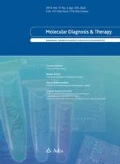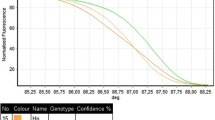Abstract
Background and objective: Mannose-binding lectin (MBL) and toll-like receptor (TLR)-4 gene polymorphisms have been implicated in inflammatory episodes in a number of studies. In view of the inflammatory nature of acute pancreatitis, we aimed to determine the predictive value of two point mutations in the promoter region at position −550 (H/L variants) and −221 (X/Y variants) of the MBL2 gene, and the Asp299Gly and 119C>A polymorphisms of the TLR4 gene on the occurrence of severe acute pancreatitis (SAP).
Methods: The study included 132 patients with SAP, 106 with mild acute pancreatitis (MAP), and 121 healthy volunteers. Genotypes were determined using restriction fragment length polymorphism analysis of PCR products and by allele-specific PCR.
Results: No significant difference in genotype frequency was noted between the patients with acute pancreatitis and controls for any of the gene loci studied. The distributions of the HY/HY, HY/LY, LY/LY, and LY/LX genotypes of MBL2 gene promoter and 119C>A genotype of the TLR4 gene were similar in patients with mild or severe acute pancreatitis. HY/LX genotype frequency was significantly higher in patients with SAP compared with MAP (26% vs 14%; p = 0.028).
Conclusion: Results indicate that the MBL2 HY/LX genotype plays an important role in the determination of disease severity to acute pancreatitis.



Similar content being viewed by others
Notes
MBL2 −550H is the wild-type (G) allele, and −550L is the variant (C). Similarly, MBL2 −221X is the wild-type (G) allele, and −221Y is the variant (C).
References
Windsor JA, Hammodat H. Metabolic management of severe acute pancreatitis. World J Surg 2000; 24: 664–72
Losanoff JE, Asparouhov OK, Jones JW. Multiple factor scoring system for risk assessment of acute pancreatitis. J Surg Res 2001; 101: 73–8
Working Party of the British Society of Gastroenterology; Association of Surgeons of Great Britain and Ireland; Pancreatic Society of Great Britain and Ireland; Association of Upper GI Surgeons of Great Britain and Ireland. UK guidelines for the management of acute pancreatitis. Gut 2005; 54Suppl. 3: 1–9
Madsen HO, Garred P, Kurtzhals JA, et al. A new frequent allele is the missing link in the structural polymorphism of the human mannan-binding protein. Immuno-genetics 1994; 40: 37–44
Lipscombe RJ, Sumiya M, Hill AV, et al. High frequencies in African and non-African populations of independent mutations in the mannose binding protein. Hum Mol Genet 1992; 3: 709–15
Lipscombe RJ, Beatty DW, Ganczakowski M, et al. Mutations in the human mannose-binding protein gene: frequencies in several population groups. Eur J Hum Genet 1996; 4: 13–9
Garred P, Larsen F, Seyfarth J, et al. Mannose-binding lectin and its genetic variants. Genes Immun 2006; 7: 85–94
Summerfield JA, Sumiya M, Levin M, et al. Association of mutations in mannose binding protein gene with childhood infection in consecutive hospital series. BMJ 1997; 26: 1229–32
Garred P, Madsen HO, Balslev U, et al. Susceptibility to HIV infection and progression of AIDS in relation to variant alleles of mannose-binding lectin. Lancet 1997; 25: 236–40
Medzhitov R. Toll-like receptors and innate immunity. Nat Rev Immunol 2001; 1: 135–45
Raby BA, Klimecki WT, Laprise C, et al. Polymorphisms in toll-like receptor 4 are not associated with asthma or atopy-related phenotypes. Am J Respir Crit Care Med 2002; 166: 1449–56
Lorenz E, Hallman M, Marttila R, et al. Association between the Asp299Gly polymorphisms in the Toll-like receptor 4 and premature births in the Finnish population. Pediatr Res 2002; 52: 373–6
Child NJ, Yang IA, Pulletz MC, et al. Polymorphisms in Toll-like receptor 4 and the systemic inflammatory response syndrome. Biochem Soc Trans 2003; 31: 652–3
Palmer SM, Burch LH, Davis RD, et al. The role of innate immunity in acute allograft rejection after lung transplantation. Am J Respir Crit Care Med 2003; 168: 628–32
Kiechl S, Lorenz E, Reindl M, et al. Toll-like receptor 4 polymorphisms and atherogenesis. N Engl J Med 2002; 347: 185–92
Boekholdt SM, Agema WR, Peters RJ, et al. Variants of toll-like receptor 4 modify the efficacy of statin therapy and the risk of cardiovascular events. Circulation 2003; 107: 2416–21
Lin YC, Chang YM, Yu JM, et al. Toll-like receptor 4 gene C119A but not Asp299Gly polymorphism is associated with ischemic stroke among ethnic Chinese in Taiwan. Atherosclerosis 2005; 180: 305–9
Zhang D, Li J, Jiang ZW, et al. Association of two polymorphisms of tumor necrosis factor gene with acute severe pancreatitis. J Surg Res 2003; 112: 138–43
Zhang DL, Li JS, Jiang ZW, et al. Association of two polymorphisms of tumor necrosis factor gene with acute biliary pancreatitis. World J Gastroenterol 2003; 9: 824–8
Dianliang Z, Jieshou L, Zhiwei J, et al. Association of plasma levels of tumor necrosis factor (TNF)-alpha and its soluble receptors, two polymorphisms of the TNF gene, with acute severe pancreatitis and early septic shock due to it. Pancreas 2003; 26: 339–43
Balog A, Gyulai Z, Boros LG, et al. Polymorphism of the TNF-alpha, HSP70-2, and CD14 genes increases susceptibility to severe acute pancreatitis. Pancreas 2005; 30: e46–50
Hofner P, Balog A, Gyulai Z, et al. Polymorphism in the IL-8 gene, but not in the TLR4 gene, increases the severity of acute pancreatitis. Pancreatology 2006; 6: 542–8
Dominguez-Munoz JE, Carballo F, Garcia MJ, et al. Evaluation of the clinical usefulness of APACHE II and SAPS systems in initial prognostic classification of acute pancreatitis: a multiple study. Pancreas 1993; 8(6): 682–6
Balthazar EJ, Robinson DL, Megibow AJ, et al. Acute pancreatitis: Value of CT in establishing prognosis. Radiology 1990; 174: 331–6
Folwaczny M, Glas J, Torok HP, et al. Toll-like receptor (TLR) 2 and 4 mutations in periodontal disease. Clin Exp Immunol 2004; 135: 330–5
Sullivan KE, Wooten C, Goldman D, et al. Mannose binding protein genetic polymorphisms in black patients with systemic lupus erythematosus. Arthritis Rheum 1996; 39: 2046–51
Gao HK, Zhou ZG, Li Y, et al. Toll-like receptor 4 Asp299Gly polymorphism is associated with an increased risk of pancreatic necrotic infection in acute pancreatitis: a study in the Chinese. Pancreas 2007; 34: 295–8
Jia TJ, Li P, Zhang SM, et al. Correlation between point mutation frequency of MBL gene exon I and plasma MBL concentration in healthy Mongolians [in Chinese]. Xi Bao Yu Fen Zi Mian Yi Xue Za Zhi 2004; 20: 261–4
Graudal NA, Madsen HO, Tarp U, et al. The association of variant mannose-binding lectin genotypes with radiographic outcome in rheumatoid arthritis. Arthritis Rheum 2000; 43: 515–21
Lorenz E, Mira JP, Frees KL, et al. Relevance of mutations in the TLR4 receptor in patients with gram-negative septic shock. Arch Intern Med 2002; 162: 1028–32
Agnese DM, Calvano JE, Hahm SJ, et al. Human toll-like receptor 4 mutations but not CD 14 polymorphisms are associated with an increased risk of Gram-negative infections. J Infect Dis 2002; 186: 1522–5
Yoon HJ, Choi JY, Kim CO, et al. Lack of Toll-like receptor 4 and 2 polymorphisms in Korean patients with bacteremia. J Korean Med Sci 2006; 21(6): 979–82
Hang J, Zhou W, Zhang H, et al. TLR4 Asp299Gly and Thr399Ile polymorphisms are vry rare in the Chinese population. J Endotoxin Res 2004; 10(4): 238–40
Hawn TR, Verbon A, Lettinga KD, et al. A common dominant TLR5 stop codon polymorphism abolishes flagellin signaling and is associated with susceptibility to Legionnaires’ disease. J Exp Med 2004; 198: 1563–72
Acknowledgments
This work was supported, in part, by grants from Shandong Natural Foundation (grant no. Y2006C20) and the Qingdao City Foundation (No. kzd05).
The authors have no conflicts of interest that are directly relevant to the content of this study.
Author information
Authors and Affiliations
Corresponding author
Rights and permissions
About this article
Cite this article
Zhang, D., Zheng, H., Zhou, Y. et al. TLR and MBL Gene Polymorphisms in Severe Acute Pancreatitis. Mol Diag Ther 12, 45–50 (2008). https://doi.org/10.1007/BF03256267
Published:
Issue Date:
DOI: https://doi.org/10.1007/BF03256267




